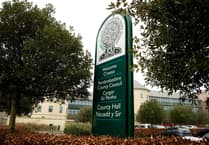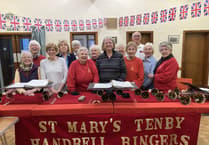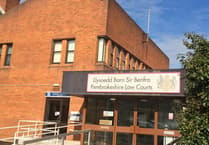The wife of a man from Pembrokeshire who was found collapsed on his bathroom floor and died three months later from an aggressive and life-limiting brain tumour - has shared his story, and aheartbreaking reminder of how brutal brain tumours can be, as she takes on a fundraising challenge this month, which she hopes will inspire others.
Mark Causey, from Kilgetty, was 61 when he was diagnosed with a glioblastoma, the most aggressive type of brain cancer. Despite treatment, Mark died 19 weeks later, in September 2024, surrounded by his family at home.
Now his wife Rosalind Causey is partnering with Brain Tumour Research by taking on their 99 Miles in November challenge to raise vital funds to find a cure for brain tumours.
Mark and sixty-two-year-old Rosalind, had recently moved from Suffolk to West Wales after Mark retired early from his job as a building services engineer in London.
They wanted a slower pace of life after decades of commuting and long hours. But in May 2024, only months after settling into their new home, tragedy struck.
Rosalind said: “Mark had driven me to my mum’s home in Margam Village, as her health was declining, Mark returned home to do some DIY. I became very worried on the Friday, I couldn’t reach him. I checked our webcam and saw the previous Monday’s footage captured him looking dishevelled and staggering.
“Then there was no more movement, anywhere at home, something was wrong. I called the police to do a welfare check. When they broke in, they found Mark collapsed on the bathroom floor. He’d been there for four days.”
When paramedics arrived, 12 hours later, Mark was semi-conscious and severely dehydrated. He was taken to Withybush General Hospital in Haverfordwest, where a CT scan revealed lesions on his brain.
-(2).jpeg?width=752&height=500&crop=752:500)
Rosalind said: “As a nurse, I knew immediately that wasn’t good. When they said ‘lesions’, my heart sank. I thought it could be a stroke or cancer. The MRI confirmed it was a tumour.”
Mark also suffered kidney failure due to dehydration. He was prescribed high-dose steroids to reduce brain inflammation and gradually regained some mobility. After three weeks in hospital, he was discharged home and invited to an outpatients appointment at Singleton Hospital in Swansea, where the neurological team delivered the devastating news.
Rosalind continued: “The consultant then told us that surgery or a biopsy wasn’t possible because the tumour had spread with spider like tendrils throughout his brain. They said that Mark only had eight to twelve weeks to live. We were numb. Mark kept saying they had to be wrong, he was determined to fight. Mark wanted more than anything to be well enough to ride the motorcycle he spent months restoring.”
Mark was prescribed chemotherapy, though without a biopsy it was uncertain if the tumour would respond. Despite his determination and brief improvement, a follow-up MRI revealed the tumour had doubled in size.
“We were devastated. He’d been walking again, first making it from the house to the garden gate, then he walked further afield to attend a bike night at our local pub. But the tumour was so aggressive,” said Rosalind.
“We looked into private hyperthermic therapy in London, which uses heat to kill cancer cells, but it was too late. His cancer was too extensive and too fast-growing.”
Mark, a keen runner and motorbike enthusiast, had completed several marathons and spent hours restoring bikes in his garage. Despite the decline, he continued to fight.
Rosalind said: “Mark didn’t want to talk about dying. Watching him fade was heartbreaking. Sometimes, I’d go into the garden to water my tomatoes so he wouldn’t see me cry. He always asked for the first ripe one.”
-(3).jpeg?width=752&height=500&crop=752:500)
“Mark did not want to end his days in a hospital, so once stable following his second blackout, his doctors agreed for him to return home where I could look after him.
“This was supported by Paul Satori hospice and NHS carers who increased their support as Mark’s needs grew. They were incredible, providing practical support such as washing and dressing Mark.
“They made tea, even did things like peel potatoes so I could spend more time with him. They took us to the polling station so we could vote, and also brought us great comfort and strength emotionally.
“They provided a hospital bed and set it in the living room so that Mark could watch the birds on the bird feeder and see the badgers that visit our patio each evening for peanuts. They even helped Mark get out into the garden so he could enjoy the sunshine and nature.
“Pembrokeshire also has an amazing mobility service run by volunteers. This life changing charity allows people to hire out wheelchair adapted vehicles, with or without volunteer drivers.
.jpeg?width=752&height=500&crop=752:500)
“This enabled Mark and I to have quality time out together such as lunch at a garden centre and visit a nature reserve after he became wheelchair bound. Those simple but very precious moments meant the world to us.”
Sadly, Mark died in September 2024, surrounded by family. His funeral reflected his passion for motorcycles, his coffin was carried on a motorcycle hearse, followed by more than 100 bikers from across the biking community.
Brain tumours kill more children and adults under 40 than any other cancer, and more men under 75 than prostate cancer, yet just 1% of the national spend on cancer research is allocated to this disease.
This November, Brain Tumour Research is inviting people to join the 99 Miles in November challenge, a fitness fundraising challenge to support research and improve outcomes for patients like Mark. Participants can walk, run, cycle, swim, or clock up miles in the gym, at their own pace, in their own way.
Rosalind said: “I’m walking 99 miles this November for Mark and for everyone affected by this cruel disease. Research is the only way we’ll stop others from going through what we did. I’ve already raised over £300, and I’ll be walking every step for him.”
.jpeg?width=752&height=500&crop=752:500)
Brain Tumour Research provides long-term funding to dedicated Brain Tumour Research Centres of Excellence at key academic institutions. This stable funding enables researchers to deliver on their innovative research which will lead to transformational impact, better treatments and improving outcomes for people affected by brain tumours.
Letty Greenfield, community development manager at Brain Tumour Research, said: “Mark’s story is a heartbreaking reminder of how brutal brain tumours can be. Rosalind’s strength and courage in sharing their experience is truly inspiring, and every mile she walks helps us move closer to finding a cure. We hope his story inspires others to take on the challenge.”
Brain Tumour Research funds sustainable research at dedicated centres in the UK. It also campaigns for the Government and larger cancer charities to invest more in research into brain tumours in order to speed up new treatments for patients and, ultimately, to find a cure.
The charity is the driving force behind the call for a national annual spend of £35 million in order to improve survival rates and patient outcomes in line with other cancers such as breast cancer and leukaemia.
To support Rosalind’s fundraising, you can head to the following link: https://www.facebook.com/donate/1585815012782684/?fundraiser_source=external_url
-(1).jpeg?width=752&height=500&crop=752:500)
.jpeg?width=209&height=140&crop=209:145,smart&quality=75)



Comments
This article has no comments yet. Be the first to leave a comment.